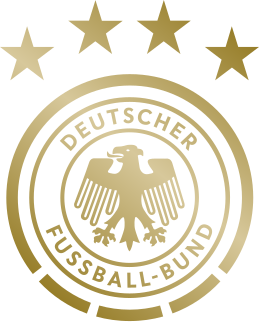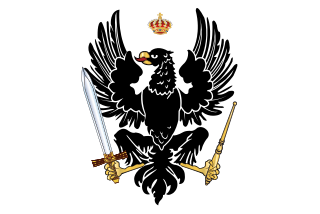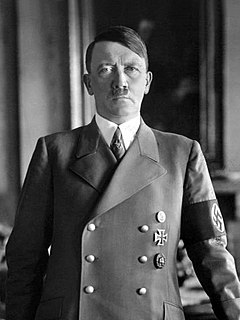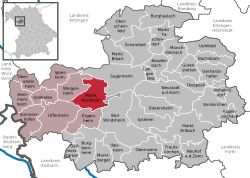
Fascism is a form of far-right, authoritarian ultranationalism characterized by dictatorial power, forcible suppression of opposition, as well as strong regimentation of society and of the economy which came to prominence in early 20th-century Europe. The first fascist movements emerged in Italy during World War I, before spreading to other European countries. Opposed to liberalism, Marxism, and anarchism, fascism is placed on the far right within the traditional left–right spectrum.

Germany, officially the Federal Republic of Germany, is a country in Central and Western Europe. Covering an area of 357,022 square kilometres (137,847 sq mi), it lies between the Baltic and North seas to the north, and the Alps to the south. It borders Denmark to the north, Poland and the Czech Republic to the east, Austria and Switzerland to the south, and France, Luxembourg, Belgium, and the Netherlands to the west.

German is a West Germanic language that is mainly spoken in Central Europe. It is the most widely spoken and official or co-official language in Germany, Austria, Switzerland, South Tyrol in Italy, the German-speaking Community of Belgium, and Liechtenstein. It is one of the three official languages of Luxembourg and a co-official language in the Opole Voivodeship in Poland. The German language is most similar to other languages within the West Germanic language branch, including Afrikaans, Dutch, English, the Frisian languages, Low German/Low Saxon, Luxembourgish, and Yiddish. It also contains close similarities in vocabulary to Danish, Norwegian and Swedish, although they belong to the North Germanic group. German is the second most widely spoken Germanic language, after English.

The German Empire or the Imperial State of Germany also referred to Imperial Germany, was the German nation state that existed from the unification of Germany in 1871 until the abdication of Emperor Wilhelm II in 1918.

East Germany, officially the German Democratic Republic, was a state that existed from 1949 to 1990, the period when the eastern portion of Germany was part of the Eastern Bloc during the Cold War. Commonly described as a communist state in English usage, it described itself as a socialist "workers' and peasants' state". It consisted of territory that was administered and occupied by Soviet forces following the end of World War II—the Soviet occupation zone of the Potsdam Agreement, bounded on the east by the Oder–Neisse line. The Soviet zone surrounded West Berlin but did not include it and West Berlin remained outside the jurisdiction of the GDR.

Nazi Germany, officially known as the German Reich until 1943 and Greater German Reich in 1943–45, was the German state between 1933 and 1945, when Adolf Hitler and the Nazi Party (NSDAP) controlled the country which they transformed into a dictatorship. Under Hitler's rule, Germany quickly became a totalitarian state where nearly all aspects of life were controlled by the government. The Third Reich – meaning "Third Realm" or "Third Empire" – alluded to the Nazis' conceit that Nazi Germany was the successor to the earlier Holy Roman Empire (800–1806) and German Empire (1871–1918). The Third Reich, which Hitler and the Nazis referred to as the Thousand Year Reich, ended in May 1945 after just 12 years, when the Allies defeated Germany, ending World War II in Europe.

U-boat is an anglicised version of the German word U-Boot[ˈuːboːt](listen), a shortening of Unterseeboot, literally "undersea boat". While the German term refers to any submarine, the English one refers specifically to military submarines operated by Germany, particularly in the First and Second World Wars. Although at times they were efficient fleet weapons against enemy naval warships, they were most effectively used in an economic warfare role and enforcing a naval blockade against enemy shipping. The primary targets of the U-boat campaigns in both wars were the merchant convoys bringing supplies from Canada and other parts of the British Empire, and from the United States to the United Kingdom and to the Soviet Union and the Allied territories in the Mediterranean. German submarines also destroyed Brazilian merchant ships during World War II, causing Brazil to declare war on both Germany and Italy on 22 August 1942.

World War II, also known as the Second World War, was a global war that lasted from 1939 to 1945. It involved the vast majority of the world's countries—including all the great powers—forming two opposing military alliances: the Allies and the Axis. In a state of total war, directly involving more than 100 million people from more than 30 countries, the major participants threw their entire economic, industrial, and scientific capabilities behind the war effort, blurring the distinction between civilian and military resources. World War II was the deadliest conflict in human history, marked by 70 to 85 million fatalities. Tens of millions of people died due to genocides, premeditated death from starvation, massacres, and disease. Aircraft played a major role in the conflict, including in the use of strategic bombing of population centres, and the only uses of nuclear weapons in war.

Angela Dorothea Merkel is a German politician who has been Chancellor of Germany since 2005. She served as the Leader of the Christian Democratic Union (CDU) from 2000 to 2018. Merkel has been widely described as the de facto leader of the European Union, the most powerful woman in the world, and by some commentators as the "leader of the free world".

The German Shepherd is a breed of medium to large-sized working dog that originated in Germany. In the English language, the breed's officially recognized name is German Shepherd Dog (GSD). The breed was officially known as the Alsatian in the UK from after the First World War until 1977 when its name was changed back to German Shepherd. Despite its primitive, wolf-like appearance, the German Shepherd is a relatively modern breed of dog, with their origin dating to 1899.

Fußball-Club Bayern München e.V., commonly known as FC Bayern München, FCB, Bayern Munich, or FC Bayern, is a German professional sports club based in Munich, Bavaria. It is best known for its professional football team, which plays in the Bundesliga, the top tier of the German football league system, and is the most successful club in German football history, having won a record 30 national titles including 8 on the bounce since 2013 and 20 national cups, along with numerous European honours.

The Germany national football team represents Germany in men's international football and played its first match in 1908. The team is governed by the German Football Association, founded in 1900. Between 1949 and 1990, separate German national teams were recognised by FIFA due to Allied occupation and division: the DFB's team representing the Federal Republic of Germany, the Saarland team representing the Saar Protectorate (1950–1956) and the East German team representing the German Democratic Republic (1952–1990). The latter two were absorbed along with their records; the present team represents the reunified Federal Republic. The official name and code "Germany FR (FRG)" was shortened to "Germany (GER)" following reunification in 1990.

.

Prussia was a historically prominent German state that originated in 1525 with a duchy centered on the region of Prussia on the southeast coast of the Baltic Sea. It was de facto dissolved by an emergency decree transferring powers of the Prussian government to German Chancellor Franz von Papen in 1932 and de jure by an Allied decree in 1947. For centuries, the House of Hohenzollern ruled Prussia, successfully expanding its size by way of an unusually well-organised and effective army. Prussia, with its capital first in Königsberg and then, in 1701, in Berlin, decisively shaped the history of Germany.

Adolf Hitler was a German politician and leader of the Nazi Party. He rose to power as the chancellor of Germany in 1933 and then as Führer in 1934. During his dictatorship from 1933 to 1945, he initiated World War II in Europe by invading Poland on 1 September 1939. He was closely involved in military operations throughout the war and was central to the perpetration of the Holocaust.

World War I, also known as the First World War or the Great War, was a global war that lasted from 28 July 1914 to 11 November 1918. Contemporaneously described as "the war to end all wars", it led to the mobilisation of more than 70 million military personnel, including 60 million Europeans, making it one of the largest wars in history. It is also one of the deadliest conflicts in history, with an estimated nine million combatant deaths and 13 million civilian deaths as a direct result of the war, while resulting genocides and the related 1918 influenza pandemic caused another 17–100 million deaths worldwide.

The Holocaust, also known as the Shoah, was the World War II genocide of the European Jews. Between 1941 and 1945, across German-occupied Europe, Nazi Germany and its collaborators systematically murdered some six million Jews, around two-thirds of Europe's Jewish population. The murders were carried out in pogroms and mass shootings; by a policy of extermination through work in concentration camps; and in gas chambers and gas vans in German extermination camps, chiefly Auschwitz, Bełżec, Chełmno, Majdanek, Sobibór, and Treblinka in occupied Poland.

Austria, officially the Republic of Austria, is a landlocked East Alpine country in the southern part of Central Europe. It is composed of nine federated states (Bundesländer), one of which is Vienna, Austria's capital and its largest city. It is bordered by Germany to the northwest, the Czech Republic to the north, Slovakia to the northeast, Hungary to the east, Slovenia and Italy to the south, and Switzerland and Liechtenstein to the west. Austria occupies an area of 83,879 km2 (32,386 sq mi) and has a population of nearly 9 million people. While German is the country's official language, many Austrians communicate informally in a variety of Bavarian dialects.
National Socialism, more commonly known as Nazism, is the ideology and practices associated with the Nazi Party—officially the National Socialist German Workers' Party —in Nazi Germany, and of other far-right groups with similar ideas and aims. Nazism is a form of fascism, with disdain for liberal democracy and the parliamentary system. It incorporates fervent antisemitism, anti-communism, scientific racism, and the use of eugenics into its creed. Its extreme nationalism originated in Pan-Germanism and the ethno-nationalist völkisch movement prominent in the German nationalism of the time, and it was strongly influenced by the Freikorps paramilitary groups that emerged after Germany's defeat in World War I, from which came the party's underlying "cult of violence". Nazism subscribed to pseudo-scientific theories of racial hierarchy and Social Darwinism, identifying the Germans as a part of what the Nazis regarded as an Aryan or Nordic master race. It aimed to overcome social divisions and create a German homogeneous society based on racial purity which represented a people's community. The Nazis aimed to unite all Germans living in historically German territory, as well as gain additional lands for German expansion under the doctrine of Lebensraum and exclude those who they deemed either community aliens or "inferior" races.






















